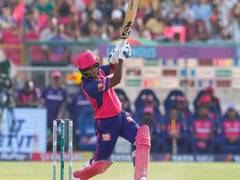For Fiji legend Waisale Serevi creating rugby awareness is No. 1 goal as India coach
Mumbai, Jul 7 (PTI) For the ‘King of The Sevens’ Waisale Serevi, who knew a very little of India before embarking on the challenge of effecting a change in the rugby landscape in the country, the primary objective is to raise awareness about the sport.
The 56-year-old ‘Hall of Famer’ Serevi has taken over as the head coach of India’s men’s and women’s teams in rugby sevens, a format he championed for in terms of its inclusion in the Olympics.
“For me, normally I don’t follow rugby on this side of the world, in Asia. But I’ve seen teams playing rugby on this side of the world,” Serevi told PTI in an exclusive interaction.
“Yes, rugby in India is like maybe five per cent of the population knows (about) — that is exactly what we are trying to build at the moment — we’re trying to get rugby awareness,” he said.
Serevi added, “You cannot go to (point) number 12 when you forget about number 2, 3, 4, 5. The most important thing for me is to do rugby awareness. The result will come anyway. Every big thing starts with a small thing,” he said.
While he has not had any experience of India before he arrived here, Serevi was quick in determining the talent that is already there in the national teams but also emphasised on reaching out to the untapped ones.
“In terms of both men and women’s team. The coaches have done a lot of good work. I’ve seen a couple of good teams. I have seen forwards, big forwards. I have seen backs, the halfbacks. In all positions on the rugby field, they have it here,” he said.
“I am excited to have them in the camp and then to try and help them understand the game, help them play what kind of rugby that I want them to play in other competitions,” said Serevi.
He added, “We have the players that’s needed in each position, like the forwards, what we call it in rugby, the forwards and the backs. We have wingers which are fast players.
“We have centres who are creating the space for the wingers. We have the halfbacks with the connection between the forwards and the backs and we have some forwards, quite big boys,” he added.
Serevi, who was a player-coach of the Fiji team which reached the final of the World Series in 2005-06, said a lot of people might have been surprised about him taking over the Indian coaching job after stints in Russia, USA and Jamaica.
“A lot of people in the world, they are surprised that I’m in India. But like I said, I’m so excited given this opportunity of trying to help, give a hand to the country that needs help, the rugby India program,” he said.
Coaching both the national teams in men’s and women’s could be difficult in terms of workload but Serevi is clear about how he would go.
“The good thing is we already have the HPU, which is the high performance (centre) and we have assistant coaches that are here that will look after the team. It’s not only me alone,” he said.
“We have two young South African coaches who have been here for the last couple of years. They have been doing a great job. They’ve been going around and coaching a couple of teams here that have won the Nationals and the Sevens tournament here,” Serevi said.
For Serevi, finding new players for Indian rugby will also be among one of the tasks.
“There are players out there that are not recognised. There might be players out there, still out there, raw talent out there in states. The main thing for me now is to try and look at the players that we have, train the players that we have,” he said.
“Another step forward is to try and go to states, to other states, to do a rugby camp for under-18. Maybe we go down to under-14, under-18, and then elite men and women, (9:07) and invite an open camp so that we can see other players that are not selected,” he added.






